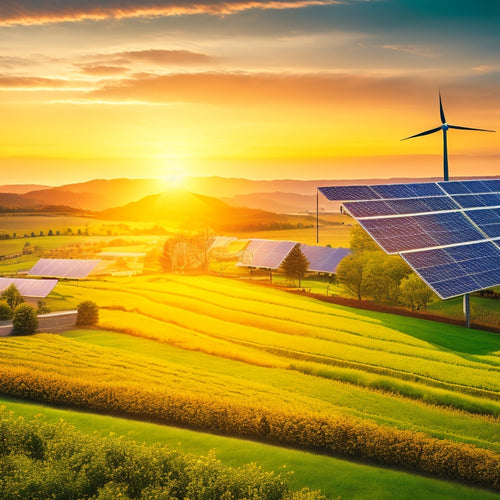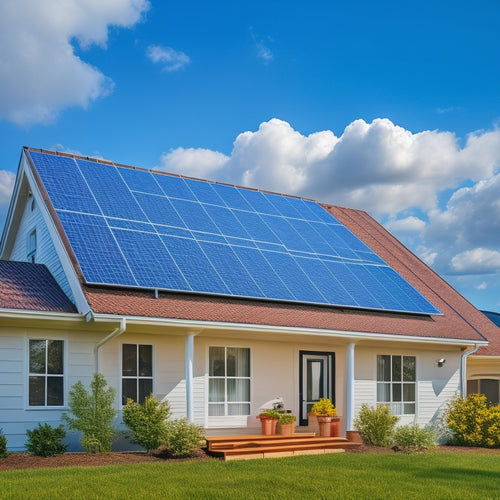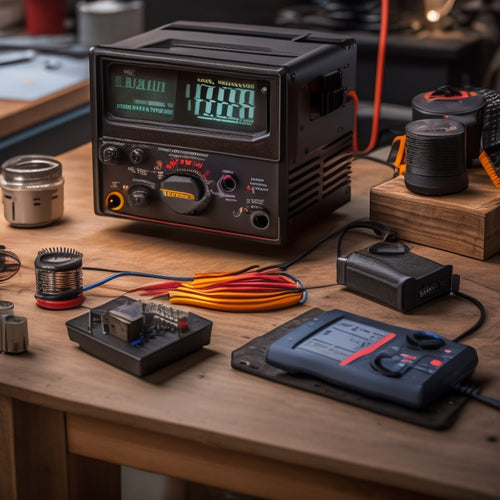
Why Optimize Your Home Energy Efficiency?
Share
By optimizing your home's energy efficiency, you'll reduce your reliance on traditional energy providers, lower your utility bills, and increase your property's value. You'll also minimize your environmental impact by decreasing greenhouse gas emissions and pollution. Additionally, energy-efficient appliances and smart home designs will provide you with reliable backup power and energy savings. By taking control of your energy usage, you'll be able to allocate your resources more effectively. As you investigate the benefits of energy efficiency further, you'll uncover even more ways to minimize your energy consumption and create a more sustainable future.
Overview
- Optimizing home energy efficiency reduces energy consumption, leading to lower utility bills and increased savings.
- Energy-efficient homes increase property value, attracting eco-conscious buyers and providing a competitive edge in the market.
- By reducing reliance on traditional energy providers, homeowners can achieve energy independence and minimize their carbon footprint.
- Energy-efficient appliances and systems reduce energy waste, promoting a sustainable lifestyle and contributing to a cleaner environment.
- Real-time energy monitoring and control enable homeowners to make data-driven decisions, optimizing their energy usage and minimizing unnecessary costs.
Home Energy Efficiency Benefits
By investing in home energy efficiency, you can reap numerous benefits that extend beyond just reducing your energy consumption.
You'll create a smart home that's not only environmentally friendly but also increases your property value. Renewable energy sources and energy efficient appliances will become more viable options, allowing you to break free from reliance on traditional energy providers.
With investment in solar energy reducing reliance on traditional energy sources, you can additionally minimize your carbon footprint.
Moreover, smart energy storage solutions can provide reliable backup power and store excess energy. Energy audits will identify areas for improvement, and insulation upgrades will minimize thermal bridging.
By incorporating passive design principles, you'll reduce the need for energy-intensive heating and cooling systems. In addition, your home will meet or exceed building codes, ensuring a safe and healthy living space.
Reduce Energy Consumption Costs
You've taken the first step towards a sustainable and self-sufficient lifestyle by investing in home energy efficiency.
Now, it's time to reap the financial benefits. By optimizing your home's energy efficiency, you'll markedly reduce your energy consumption costs. Conducting energy audits will help identify areas of improvement, and implementing those changes can lead to substantial savings.
Evaluating your energy needs through total consumption calculation and energy audit energy needs evaluation is vital to understanding where to make changes. Additionally, you may be eligible for utility rebates, which can offset the initial investment costs.
With energy-efficient appliances, insulation, and windows, you'll enjoy lower utility bills and a reduced carbon footprint. By making these changes, you'll not only save money but also gain more control over your energy usage, giving you the freedom to allocate your resources as you see fit.
Environmental Impact of Energy
Frequently, homeowners overlook the environmental impact of their energy consumption, but it's vital to reflect on the broader consequences of your daily habits. Your energy usage contributes to greenhouse gas emissions, air pollution, and climate change. By adopting sustainable practices and shifting to renewable resources, you can greatly reduce your carbon footprint.
| Energy Source | Environmental Impact | Sustainable Alternative |
|---|---|---|
| Fossil Fuels | High greenhouse gas emissions | Solar Power |
| Coal | High air pollution | Wind Energy |
| Natural Gas | Contributes to climate change | Geothermal Energy |
| Nuclear | Radioactive waste production | Hydro Energy |
| Biomass | Deforestation and habitat destruction | Biofuels |
Home Energy Monitoring Systems
As you consider the environmental impact of your energy consumption, it's clear that comprehending your energy usage is key to making sustainable changes.
With a home energy monitoring system, you can track your energy consumption in real-time, identifying areas where you can cut back.
Real-time performance monitoring systems facilitate proactive measures to prevent downtime or energy loss, allowing you to make data-driven decisions to reduce your energy consumption.
Smart meters and energy dashboards provide detailed observations into your energy usage patterns, helping you optimize your energy efficiency.
By monitoring your energy usage, you can pinpoint energy-wasting habits and appliances, and make data-driven decisions to reduce your energy consumption.
With this knowledge, you're equipped to take control of your energy usage, reducing your environmental footprint and saving money on your energy bills.
Energy Efficiency Improvement Tips
Your home's energy efficiency relies on identifying and addressing energy-wasting habits and practices. By conducting an energy audit, you'll pinpoint areas for improvement.
Consider insulation upgrades to reduce heat loss, and invest in appliance efficiency to minimize standby power consumption. Solar installations can greatly reduce your reliance on the grid.
Regular HVAC maintenance guarantees your system operates at peak performance. Update your window treatments to optimize natural light and heat.
Install smart thermostats to regulate your home's temperature with precision. Finally, make informed lighting choices by switching to energy-efficient LED bulbs.
DIY Energy Efficiency Projects
By taking matters into your own hands, you can markedly reduce your energy consumption and costs through DIY energy efficiency projects.
Start with energy auditing techniques to identify areas of improvement, then tackle weatherization projects like sealing air leaks and adding insulation upgrades.
Consider solar panel installation or heat pump benefits to utilize renewable energy.
Upgrade to a smart thermostat to optimize your heating and cooling systems.
Replace traditional bulbs with LED lighting retrofits to reduce energy waste.
Incorporate passive solar design principles into your home's design to maximize natural light and heat.
With these DIY projects, you'll be well on your way to achieving energy efficiency and reducing your environmental footprint.
Achieving Energy Independence Goals
You're taking an essential step towards achieving energy independence by reducing your reliance on external energy sources and decreasing your carbon footprint.
By doing so, you'll not only lower your energy bills but also contribute to a more sustainable future.
To reach these goals, you'll need to implement strategic measures that optimize your home's energy performance and minimize its environmental impact.
Reduce Energy Reliance
Since the Industrial Revolution, humanity has relied heavily on fossil fuels to power its growth and development, but this reliance comes at a steep environmental cost.
You can break free from this dependence by reducing your energy reliance. By incorporating renewable energy sources, such as solar or wind power, into your home's energy system, you'll decrease your reliance on fossil fuels.
Smart technology can also help you optimize your energy usage, allowing you to control and monitor your energy consumption in real-time. This means you'll have more control over your energy usage and can make data-driven decisions to reduce your reliance on non-renewable energy sources.
Lower Carbon Footprint
Your home's carbon footprint is a significant contributor to climate change, and reducing it's essential for achieving energy independence goals.
By optimizing your home's energy efficiency, you'll not only reduce your reliance on non-renewable energy sources but also lower your carbon emissions.
Implementing sustainable lifestyle choices, such as using energy-efficient appliances and LED lighting, can make a significant impact.
Additionally, consider carbon offsetting strategies, like investing in renewable energy projects or reforestation efforts, to offset your remaining emissions.
Frequently Asked Questions
What Is the Average Cost of a Home Energy Audit?
You'll typically pay between $300 to $1,000 for a home energy audit, depending on factors affecting costs like location, size, and complexity of your home, as well as the benefits you'll reap from identifying energy-wasting areas and opportunities for improvement.
Can Energy-Efficient Appliances Be Used With Solar Power?
As you utilize the sun's fiery power, you'll find that energy-efficient appliances seamlessly integrate with solar energy, amplifying their benefits, such as reduced consumption and lower bills, and ensuring a harmonious, sustainable orchestra in your home.
How Long Does It Take to See Energy Savings Results?
You'll typically start seeing energy savings results within 3-6 months, depending on your energy consumption patterns and the efficiency of your new appliances or system. Your savings timeline will vary, but monitoring your usage will help you track progress.
Are Energy-Efficient Upgrades Tax-Deductible in the Us?
You'll be pleased to know that energy-efficient upgrades can earn you tax credits in the US, providing significant energy incentives; check the IRS website for eligible improvements and claim your deductions, enhancing your freedom to save and invest.
Can Renters Make Energy-Efficient Changes to Their Homes?
As you traverse the rental environment, remember that even the most temporary of love affairs - like Odysseus' fleeting stops - can leave a lasting impact; you can make temporary energy-efficient improvements, but be aware of renter restrictions that may limit your eco-friendly efforts.
Ready to Buy
As you've seen, optimizing your home energy efficiency is a win-win-win: it saves you money, reduces your carbon footprint, and enhances your independence. By implementing these changes, you'll be shining a guiding light of sustainability in your community. Like a snowball rolling down a hill, small changes can gain momentum, leading to a significant impact. So, take the first step today and watch your energy efficiency snowball grow into a force for good!
Related Posts
-

Net Metering in Renewable Energy's Future
Net metering's future is vital for driving renewable energy growth and financial savings. You can reduce your electri...
-

Cost of Solar Panel Installation
You can expect to pay between $15,000 and $30,000 or more for a typical solar panel installation, depending on the sy...
-

Key Features of a DC to AC Converter
A DC to AC converter features high efficiency and conversion rates, which reduce energy costs and improve performance...


